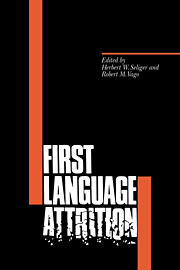Book contents
- Frontmatter
- Contents
- List of figures
- List of tables
- List of contributors
- Acknowledgment
- Part I Survey studies
- 1 The study of first language attrition: an overview
- 2 First language attrition and the parameter setting model
- 3 Recapitulation, regression, and language loss
- 4 First language loss in bilingual and polyglot aphasics
- 5 A crosslinguistic study of language contact and language attrition
- Part II Group studies
- Part III Case studies
- Index
1 - The study of first language attrition: an overview
Published online by Cambridge University Press: 14 January 2010
- Frontmatter
- Contents
- List of figures
- List of tables
- List of contributors
- Acknowledgment
- Part I Survey studies
- 1 The study of first language attrition: an overview
- 2 First language attrition and the parameter setting model
- 3 Recapitulation, regression, and language loss
- 4 First language loss in bilingual and polyglot aphasics
- 5 A crosslinguistic study of language contact and language attrition
- Part II Group studies
- Part III Case studies
- Index
Summary
Introduction
The primary concern of the present text is the disintegration or attrition of the structure of a first language (L1) in contact situations with a second language (L2). Bilingualism, under which we include the more general case of multilingualism, is a natural setting for the unraveling of native language abilities; pathological states such as aphasia and senile dementia are further contexts for attrition effects. Attrition phenomena develop in bilingual individuals as well as bilingual societies, in both indigenous and immigrant communities. At its extreme, attrition leads to what has come to be known as “language death” (cf. Dorian 1981; Schmidt 1985).
The articles brought together in this volume approach first language attrition from diverse angles. The survey studies in Part I draw general conclusions from empirical evidence presented in the literature, while the articles in Parts II and III discuss specific properties of L1 attrition based on the analysis of data they present. The group studies of Part II investigate attrition in societal bilingualism or in groups of bilingual individuals, while the case studies of Part III concentrate on single bilingual subjects, both children and adults. These works employ a wide range of data gathering methodologies: direct response requests such as untimed grammaticality judgement and fill-in tasks, translations, story telling prompted by pictures, paradigm elicitation, as well as free conversations (indirect). Attrition in bilingual aphasic individuals is discussed by de Bot & Weltens; Obler & Mahecha; and Dressler; in moribund languages by Schmidt and by Dressler.
- Type
- Chapter
- Information
- First Language Attrition , pp. 3 - 16Publisher: Cambridge University PressPrint publication year: 1991
- 43
- Cited by



